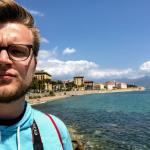Support
My name is Paul-Hudson Erwin, I am in the class of 2021 at St. Lawrence University and I am majoring in Global Studies while minoring in European Studies and Francophone Studies. I am from the small town of Cornwall, NY – about an hour north of New York City – and I was fortunate to receive funding for my travel enrichment grant from Rod Giltz, who himself graduated SLU in 1959. My travel enrichment grant took place during my study abroad in Bordeaux, France in the Spring 2019 semester. The title for my project was “Photographic Study of French Island & French Mainland Culture: Corsica v Bordeaux” and it involved me taking pictures and comparing certain aspects of French culture in Bordeaux and in the two Corsican cities of Bastia and Ajaccio. My French professor during the Fall of 2018 was from Corsica, which sparked my interest in the differences between “mainland” and “island” France. It intrigued me how Corsica was part of France, yet they spoke their own language and was closer to Italy, not to mention how it was originally part of Italy and then bought by France. One of the most prominent Corsican figures is Napoleon Bonaparte, who is a figure not held in high regard by most of the world – except in his birthplace where he is celebrated, his image is plentiful around the island and he even has his own huge statue with some very touching words dedicated to him. This relationship, between Corsica and France – and Corsica and the rest of the world – is something I wanted to explore in person.
With the help of my generous donor Mr. Rod Giltz supplying all of the funds, I had requested, exploring the relationship between Corsica and France was possible. I established several aspects of culture that I could capture with photography so I could use my strengths while documenting my findings. Overall, I found the two cultures quite different as my pictures will do more justice in showing, even though they are in the same country. I found differences in the geographic landscape, restaurants, transportation, monuments, flags, and street art aspects. For geographic landscape, this was the most obvious difference since Bordeaux was a very flat landscape with a river running through it, whereas the island of Corsica was a very rough, mountainous terrain surrounded by the Mediterranean Sea. The ports in both Corsican cities (Ajaccio and Bastia) made Corsica seem entirely different from Bordeaux already, the ports seemed central to Corsican life which was not the case in Bordeaux. For restaurants, the difference was not as apparent, but I definitely experienced this when I was trying to find food. There were not as many restaurants on the island as there were in Bordeaux and a majority of the restaurants in Corsica were pizza shops, something one would associate with Italy. Seafood was also a very popular dish, such as “Moules et frites” or mussels and fries. The pizza shops and abundance of Italian restaurants along with the Mediterranean weather made Corsica feel more like Italy than France; this has some grounding to it since Corsica used to be part of Italy until France bought it in 1768. In Bordeaux the food was traditional French food along with the usual fast food choices one could find in America. Concerning transportation, there were no trams on the island of Corsica although throughout Bordeaux trams mapped the city, a big difference in the ease of getting around a city. The monuments around Corsica were either independence, France, or Napoleon related. This wasn’t much different to the monuments in Bordeaux, apart from Napoleon. Napoleon is looked down upon by the rest of France and the world in general but in Corsica he is certainly celebrated. The Corsican flag was flown throughout the island of Corsica often alongside the European Union and French flags, whereas in Bordeaux flags were not flown much at all, although if I saw a flag it was the French flag. Street art in France was not heavily political and was more aesthetic art, whereas in Corsica it was chiefly political. Throughout both cities – Ajaccio and Bastia – I could tell freedom from France was a central theme. In Bastia I quite often saw the graffiti “Liberazione Nazionale” and “Corsica Libera,” amid stickers of the Corsican flag, a symbol of Corsican pride and perhaps a wanting to separate from France – a bigger political issue surrounding the island.
The experience of traveling and experiencing the island of Corsica on my own was truly an enriching experience. As I am a Global Studies major and a Francophone Studies minor, my experience has made me think more deeply about global and political issues that may be intertwined in the relationship between Corsica and France. Being granted the opportunity to travel, take pictures, and practice French was incredible and I am truly grateful to my donor Mr. Rod Giltz, combining my major, minor, and main interest on my travel enrichment grant.
